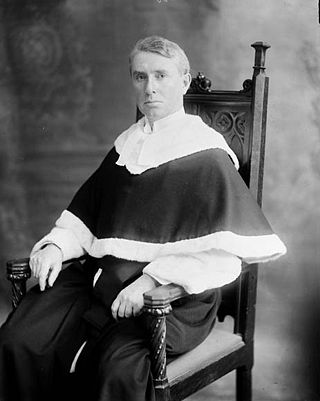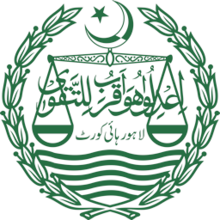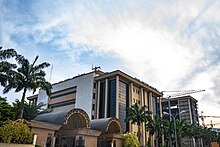The Supreme Court of the State of New York is the trial-level court of general jurisdiction in the New York State Unified Court System. It is vested with unlimited civil and criminal jurisdiction, although in many counties outside New York City it acts primarily as a court of civil jurisdiction, with most criminal matters handled in County Court.

The term magistrate is used in a variety of systems of governments and laws to refer to a civilian officer who administers the law. In ancient Rome, a magistratus was one of the highest ranking government officers, and possessed both judicial and executive powers. In other parts of the world, such as China, magistrate is a word applied to a person responsible for administration over a particular geographic area. Today, in some jurisdictions, a magistrate is a judicial officer who hears cases in a lower court, and typically deals with more minor or preliminary matters. In other jurisdictions, magistrates are typically trained volunteers appointed to deal with criminal and civil matters in their local areas.
Chapter 9: Judiciary.Chapter 9 of the 1997 Constitution of Fiji is titled Judiciary. It is divided into twenty-two sections, setting out the composition and functions of the Judicial branch of the Fijian government.
The Federal Court of Canada, which succeeded the Exchequer Court of Canada in 1971, was a national court of Canada that had limited jurisdiction to hear certain types of disputes arising under the federal government's legislative jurisdiction. Originally composed of two divisions, the Appellate Division and the Trial Division, in 2003 the Court was split into two separate Courts, the Federal Court and the Federal Court of Appeal. The court used facilities as the Supreme Court of Canada Building as well as Thomas D'Arcy McGee Building and registry office at 90 Elgin Street.
The Superior Court of Justice is a superior court in Ontario. The Court sits in 52 locations across the province, including 17 Family Court locations, and consists of over 300 federally appointed judges.

The Supreme Court of Florida is the highest court in the U.S. state of Florida. It consists of seven justices—one of whom serves as Chief Justice. Six members are chosen from six districts around the state to foster geographic diversity, and one is selected at large.
The judiciary of Australia comprises judges who sit in federal courts and courts of the States and Territories of Australia. The High Court of Australia sits at the apex of the Australian court hierarchy as the ultimate court of appeal on matters of both federal and State law.

The Lahore High Court is a provincial court house based in Lahore, Punjab, Pakistan. It was established as a high court on 21 March 1882. The Lahore High Court has jurisdiction over the province of Punjab. The High Court's principal seat is in Lahore, but there are benches in three other cities of the province: Rawalpindi, Multan and Bahawalpur. A proposal was sent by lawyers to set up new high court benches in Faisalabad, Sialkot, D.G.Khan and Gujranwala divisions but full court of Lahore High Court turned down this request.

The Supreme Court of Nigeria (SCN) is the highest court in Nigeria, and is located in the Central District, Abuja, in what is known as the Three Arms Zone, so called due to the proximity of the offices of the Presidential Complex, the National Assembly, and the Supreme Court.

In most legal jurisdictions, a supreme court, also known as a court of last resort, apex court, and highcourt of appeal, is the highest court within the hierarchy of courts. Broadly speaking, the decisions of a supreme court are not subject to further review by any other court. Supreme courts typically function primarily as appellate courts, hearing appeals from decisions of lower trial courts, or from intermediate-level appellate courts.

The judiciary of Pakistan is the national system of courts that maintains the law and order in the Islamic Republic of Pakistan. Pakistan uses a common law system, which was introduced during the colonial era, influenced by local medieval judicial systems based on religious and cultural practices. The Constitution of Pakistan lays down the fundamentals and working of the Pakistani judiciary.

The judiciary of India is a system of courts that interpret and apply the law in the Republic of India. India uses a common law system, first introduced by the British East India Company and with influence from other colonial powers and Indian princely states, as well as practices from ancient and medieval times. The Constitution of India provides concept for a single and unified judiciary in India.

The judicial officers of the Republic of Singapore work in the Supreme Court and the State Courts to hear and determine disputes between litigants in civil cases and, in criminal matters, to determine the liability of accused persons and their sentences if they are convicted.
Idris Legbo Kutigi was a Nigerian lawyer and jurist. He was Attorney General and Commissioner for Justice in Niger State before becoming a high court judge. He joined the Supreme Court of Nigeria in 1992 and served as Chief Justice from 30 January 2007 to 30 December 2009.

The Law of Nigeria consists of courts, offences, and various types of laws. Nigeria has its own constitution which was established on 29 May 1999. The Constitution of Nigeria is the supreme law of the country. There are four distinct legal systems in Nigeria, which include English law, Common law, Customary law, and Sharia Law. English law in Nigeria is derived from the colonial Nigeria, while common law is a development from its post-colonial independence.

The Federal Court of Appeal of Nigeria is the intermediate Appellate Court of the Nigerian federal court system. The Court of Appeal of Nigeria decides appeals from the district courts within the federal judicial system, and in some instances from other designated federal courts and administrative agencies. As at 2010, there are 66 judges of the Nigerian courts of appeals authorized by the Senate. These judges are recommended by the National Judicial Council (NJC), nominated by the President of Nigeria and confirmed by the Senate. There are currently seventy-two Nigerian courts of appeals across the six geopolitical zones of Nigeria. There are 12 in the North-Central, 10 in North-East, 10 in North-West, 10 in South-South, 9 in South-East and 11 in South Western Nigeria. The headquarter is located at Three Arms Zone, Abuja.
The National Industrial Court of Nigeria also known as NICN is a court empowered to adjudicate trade disputes, labour practices, matters related to the Factories Act, Trade Disputes Act, Trade Unions Act, Workmen’s Compensations Act and appeals from the Industrial Arbitration Panel and all other employment matters in Nigeria. As a specialized Labor Court, all matters adjudicated by it are exclusive to the court and its decisions were hitherto, subject only to appeal when certain conditions were met. Currently, appeals can be made to the Court of Appeal by leave.

The judiciary of South Korea is the judicial branch of South Korean central government, established by Chapter 5 and 6 of the Constitution of South Korea.

Since the new constitution of Ethiopia enacted in 1995, Ethiopia's legal system consisted of federal law with bicameral legislature. The House of People's Representatives (HoPR) is the lower chamber of bicameral legislature of Federal Parliamentary Assembly with 547 seats and the House of Federation with 108 seats, the former vested on executive power of Prime Minister and the Council of Ministers, and the latter have authority to interpret federal law and oversees regional and federal decisions.
Abayomi Sunday Fasina is a Nigerian professor of soil science who became the Vice Chancellor of the Federal University Oye Ekiti, Ekiti state, Nigeria since 2021. He was the deputy vice Chancellor (Administration) until his appointment as the Vice-Chancellor. His appointment became a subject of controversy when a suit marked, FHC/ABJ/CS/250/2021, challenging the process was instituted in a Federal High Court sitting in the Federal Capital Territory, Abuja, by a Non-governmental Organization called Tableland Society For the Oppressed (TSFO). The court in its ruling on 17 February 2022, held that the claimant (TSFO) did not have the legal right to institute the suit, while the trial judge also ruled that the court lacked jurisdiction to entertain the matter, and consequently struck out the suit.











